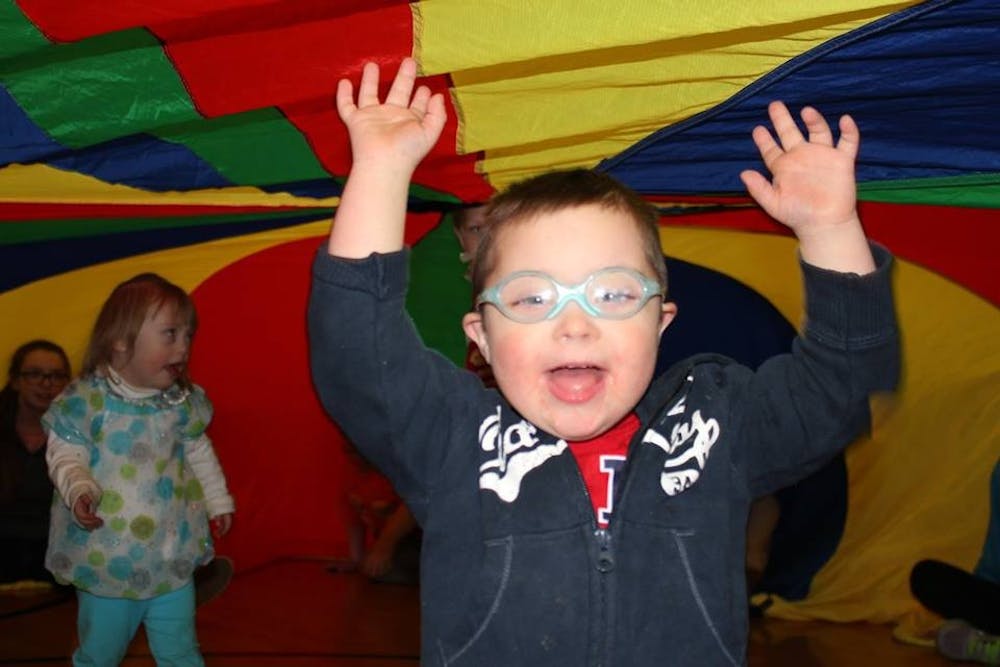Special Olympics Michigan: One for the kids, Young Athletes program an avenue for child athletes
In many ways, the odds have been stacked against three-year-old Preston Rollison since the day he was born. His hearing is significantly impaired, he has poor eyesight and the Waterford boy was diagnosed with Down syndrome at birth.
However, nothing will stop Preston from having fun or competing with his friends this weekend at the Special Olympics Michigan Summer Games.
Rollison is one of 20 children who will participate in the Young Athletes program, which offers opportunities for athletes younger than eight-years-old to compete the same way the adults do each year.
His mother, Roxanne, said she is grateful for everything the program does for her family since her son’s first involvement just months after he was born.
“I’ve always focused not on what Preston can’t do, but what he can do,” she said. “I can’t imagine life for him or for our entire family without the Special Olympics and this program.”
Children are not eligible to compete in the summer games until they are eight years old. Fitting with the original mission of the games, and to allow more involvement for children younger than the cutoff age, the program was created 2007 after an overwhelming amount of parents called for their child’s inclusion.
The activities young athletes participate in as part of the program consist of walking and running, balancing and jumping and more.
The program has served more than 100,000 children in 21 countries worldwide. It is funded almost entirely by private donations.
Young athletes are encouraged to have fun, no matter their athletic ability or developmental stage.
“The idea is for young, potential athletes to gain social skills as well as stay active and eventually be able to compete in the games once they are old enough,” said Anne Rogers, the program’s coordinator. “It also helps parents come together and talk about some of the issues they face. There is a great deal of bonding going on. It’s really incredible to see.”
For Sarah Waite and her three-year-old son, Wesley, the games have been attraction that has brought much joy to their lives each summer. Wesley has been participating in the games through the Young Athletes program since he was four months old.
“We were hooked right away,” said Waite, of Clare. “Over the past few years, I have watched his development, his mobility, his social interaction, so much just advance and improve. It is so encouraging.”
Being around other children with similar disabilities and athletic aspirations has been a fun, and formative experience for Wesley.
“He finally gets to fit in. He can just be a normal kid,” she said.
Many young athletes participate year-round in the various fundraisers orchestrated by Special Olympics Michigan each year.
Wesley, for example, leads “Wesley’s Warriors,” in the popular Special Olympics Polar Plunge fundraiser, an event that has given Waite an opportunity to gain advice from or share stories with other families.
“These are some of the best friendships I have made,” Waite said. “We share some of our challenges and some of the joys we all share. We all know how much each child young athletes has progressed. It’s a great discussion to have.”
Aaron Mills, Special Olympics Michigan’s public relations coordinator, said the Young Athletes program is unique in that regard.
“A lot of parents were just waiting for something like this to come along,” Mills said. “Wesley is just a fun-loving kid. He’s come so far. He is just one example of the good this program has done.”
Parents often receive resounding positive feedback from outside professionals working with their children thanks to participating in the program.
“Some of those professionals say they have seen a very noticeable difference in things such as balance and agility even after only a few weeks in our program,” Anne Rodgers, program coordinator said.
Aside from the many benefits displayed through the growth of the athletes, many parents get a great deal of pride and satisfaction out of the program as well – especially fathers of young athletes, Rogers said.
“A lot of them have dreams of being a coach,” she said. “This gives them an opportunity to fulfill what they thought was not going to happen.”
To Rollison, and her resilient and fun-loving son Preston, the program is invaluable.
“Where we would be if he was not involved in this program, I don’t know,” Roxanne said. “I just get a lump in my throat when I see him so successful with all of this. The organization really cares about these kids.”
“He is just going to be so much better off because of it.”




